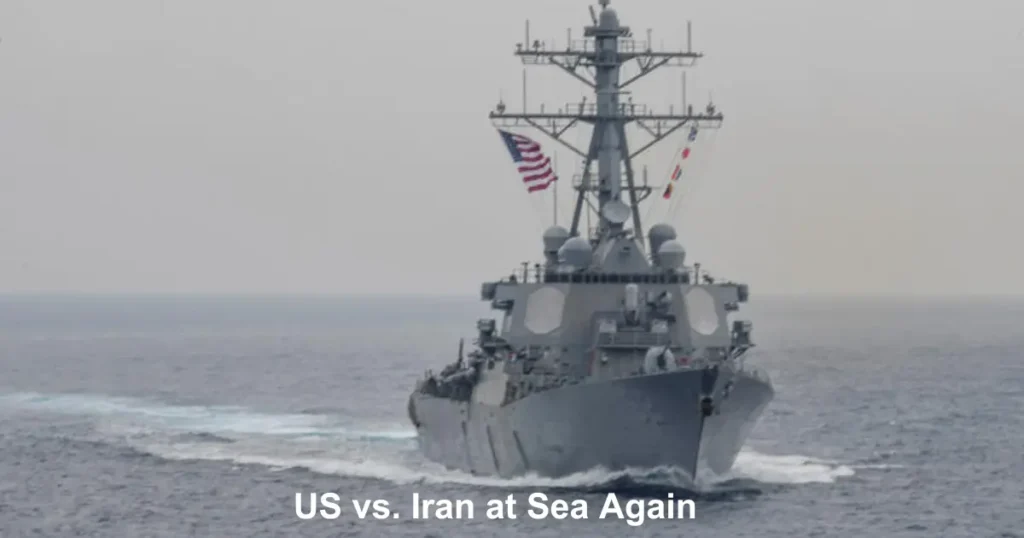As a new naval encounter grabs headlines, escalating tensions in the Gulf of Oman are once again putting the region under the global spotlight.
On the morning of July 23, 2025, a tense encounter unfolded at sea between the USS Fitzgerald, a U.S. Navy destroyer, and an Iranian military helicopter — rekindling concerns about a possible military conflict in an area where stability has long been precarious.
So, what really unfolded in those international waters?
And why are Iran and the U.S. telling two very different versions of the same story?
🚁 The Encounter: Iranian Helicopter Confronts US Destroyer
According to Iranian state media, the incident occurred between 10:00 AM and 10:50 AM local time, when the USS Fitzgerald was navigating international waters in the Gulf of Oman.
-
Iran dispatched a SH-3 “Sea King” helicopter to intercept the destroyer as it allegedly approached waters “monitored by the Islamic Republic.”
-
Iranian reports claim the helicopter issued a direct warning, flew over the destroyer at close range, and instructed it to alter course immediately.
-
They further allege that after the US vessel responded with a threat, Iranian air defense systems were activated, and the helicopter was declared to be operating under full protection of Iran’s integrated air defense.
-
Ultimately, Iran claims the USS Fitzgerald turned south and left the area — interpreting this as a retreat
🇺🇸 The US Responds: “Safe and Professional Interaction”
In sharp contrast, a U.S. defense official dismissed Iran’s claims and characterized the incident as:
“A safe and professional interaction that had no operational impact on the USS Fitzgerald’s mission.”
Additionally, U.S. Central Command (CENTCOM) stated that reports suggesting otherwise were false and misleading, pointing to Iran’s disinformation efforts.
According to U.S. officials:
The destroyer was operating in international waters at all times.
No aggressive maneuver or breach of territorial limits occurred.
🔍 Differing Accounts: Who’s Really Telling the Truth?
Clashes between the U.S. and Iran at sea aren’t unusual — but this one feels different, mainly because of when it happened and the situation around it.

🔑 Key Context:
Just weeks ago, U.S. B-52 bombers targeted Iranian nuclear facilities.
Tehran claimed the sites were meant purely for peaceful, civilian use, while Washington argued they were secretly linked to a weapons program.
The incident marks the first direct face-off between U.S. and Iranian troops since the 12-day war between Israel and Iran, in which U.S. involvement escalated regional tensions.
While Washington maintains that everything proceeded without disruption, Iranian media pushes back, accusing the U.S. of distorting the facts to minimize what truly occurred — even asserting that the American cruiser was eventually compelled to withdraw.
🌐 What the Law Says
Under UNCLOS (United Nations Convention on the Law of the Sea):
Naval vessels are free to travel in international waters.
But when countries like Iran stretch their monitoring zones past recognized borders, it often leads to confusion — and sometimes, standoffs like this one.
🌍 Why It Matters
The Strait of Hormuz, right beside the Gulf of Oman, carries over 20% of the world’s oil — making it one of the most vital energy routes on the planet.
Any military clash in this region can shake up global oil prices, disrupt shipping routes, and spark worldwide concern.
It also puts pressure on key players like India, China, the EU, and Russia, all of whom rely on stability in this region.
🧭 Conclusion: Calm on the Surface, Trouble Below
Whether the USS Fitzgerald really backed off or not is beside the point.
What’s certain is that tensions between the U.S. and Iran have reached international waters — and this may only be the beginning.
Are we witnessing the early signs of a new Cold War — this time playing out at sea?
📊 At a Glance: Essential Information
| What Happened | Details |
|---|
| Date | July 23, 2025 |
| Time | 10:00–10:50 AM (local time) |
| Location | Gulf of Oman — international waters |
| Who Was Involved | USS Fitzgerald (U.S. Navy) and SH-3 Sea King (Iran) |
| Iran’s Version | U.S. destroyer was warned and forced to back off |
| U.S. Response | Routine, professional interaction — no retreat |
| Why It Matters | Ties to recent U.S. airstrikes & Iran-Israel tensions |
🔖 Final Take
In today’s global world, one military standoff can shift opinions, move markets, and stir up international politics.
The Gulf of Oman standoff is a strong reminder that even calm waters can conceal rising tensions beneath.